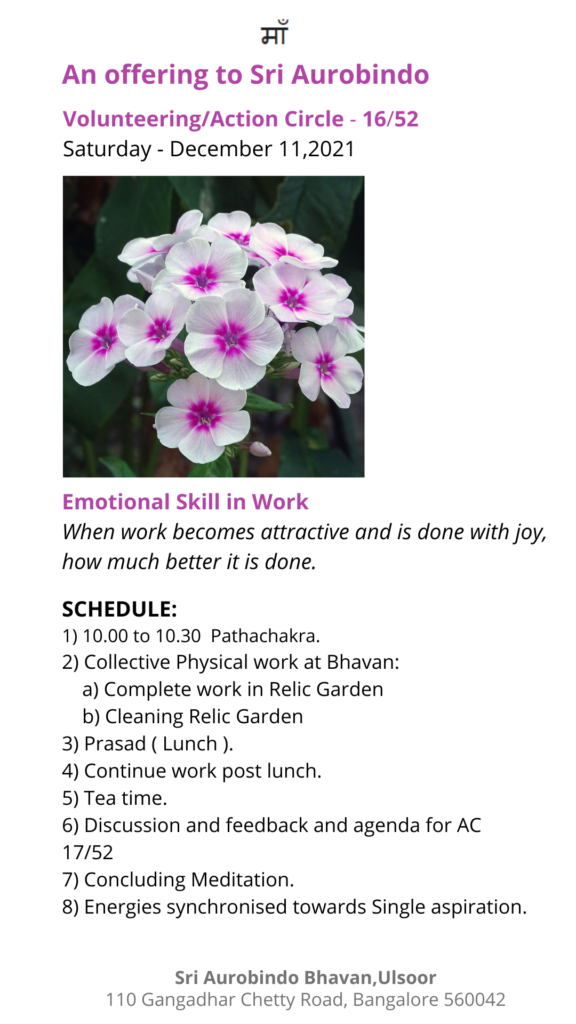TIMING:
- BHAVAN
Morning: 7:00am – 12:30pm (everyday)
Evening: 4:30pm – 7:00pm (everyday) - SALES CENTER
Morning: 9:30am – 12:30pm (everyday)
Evening: 4:30pm – 7:00pm (everyday,except Monday)
LOCATION:
Sri Aurobindo Bhavan,
110, Gangadhar Chetty Road,
Bangalore - 560042
Tel: +91-80-25559885, +91-80-41510812
Email: sriaurobindobhavan.bangalore@gmail.com
History of the Bhavan
Built in 1905, this stately pile has been a family home, a reluctant ruler’s palace, and is now a spiritual centre. Its early history is slightly hazy.
According to one family’s lore, the building was the building was constructed by a son or grandson of Gangadhar Chetty, a wealthy merchant and contractor in the erstwhile Civil and Military (C and M) Station of Bangalore, and after whom the road itself is named.
Chetty probably sold the house to T Vijaya Raghavulu Naidu, a respected officer in the C and M Station’s administration. According to Naidu’s great-granddaughter Lalitha Jayakumar, her grandfather T Abboy Naidu then sold the house when he required funds for his daughter’s wedding.
The house was bought by Colonel Jai Prithvi Bahadur Singh, the Raja of Bajhang, a principality in Nepal. Jai Prithvi was no ordinary dynast. He was the son-in-law of the Prime Minister Chandra Shumsher Rana,then the most powerful man in Nepal.
He was also a writer, spiritual seeker, educationist and reformer. He published several books for students and general readers on varied topics, started the publication of one of Nepal’s earliest newspapers and general readers on varied topics, started the publication of one of Nepal’s earliest newspapers, undertook land reform and established the first school for commoners in Bajhang.
In 1916, Jai Prithvi abdicated in favour of his father and moved with his family to Nainital. He bought the house on Gangadhar Chetty Road in 1921.
His new home, renamed Jaya Bhavan, became the centre of much of his spiritual work. In 1928, he set up the Humanistic Club. The weekly meetings held in Jaya Bhavan were often addressed by luminaries including Sir M Visvesvaraya.
As a foreign national, especially one who fraternised with inquirers and intellectuals, the British Raj naturally kept tabs on him, suspecting him of espionage. In 1932, when the Mysore State made him a state subject,the British government fretted about the retired Raja, describing the peace-loving Jai Prithvi as “a thoroughly undesirable individual.” In May 1940, his movements were curtailed. He died on September 15, 1940.
Jaya Bhavan was home to other Nepali royals, including Jai Prithvi’s brothers-in-law Mohan Shamsher who died in Bengaluru in 1967, and Krishna Shamsher, who came here in the 1960s, fleeing political persecution. He died in 1977.
Two years later, his wife donated the bungalow to the Sri Aurobindo Society.
As appeared in Deccan Herald: https://www.deccanherald.com/india/karnataka/aurobindo-bhavan-a-regal-house-by-ulsoor-lake-1038898.html
VOLUNTEER:
Every Saturday we organize an Action Circle where we work on small projects at the Bhavan. It may be painting the gate, creating a new Symbol of Sri Aurobindo in the garden or weeding a section of our beautiful garden. The work is done as an offering to Sri Aurobindo. It’s a whole day program, we begin by a Study circle and then proceed to the days work. If you are a devotee of the Mother and Sri Aurobindo and are aspiring to live Their teachings in a collective environment, this is the place for you. Come join us. Please email us at sriaurobindobhavan.bangalore@gmail.com if you have any questions. Below is a sample of one of the day’s program.

